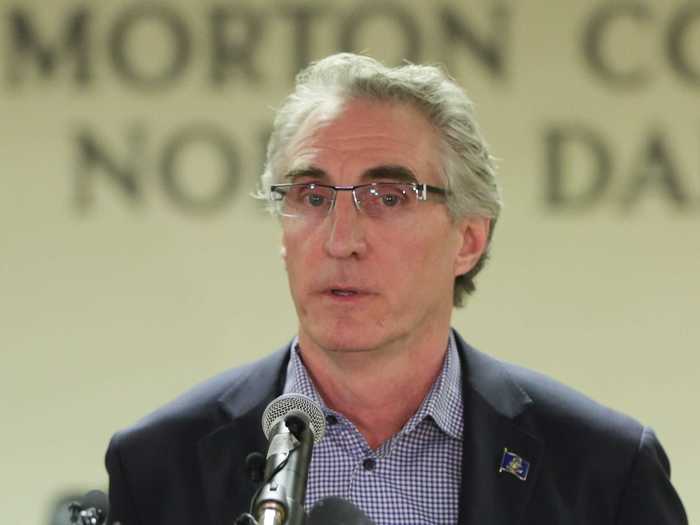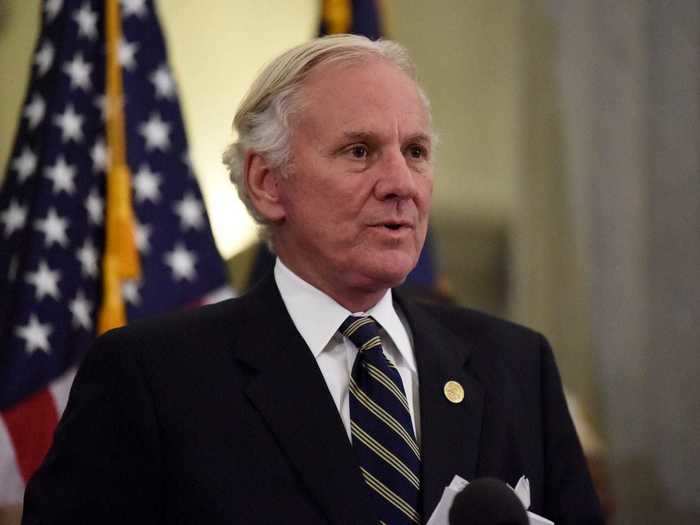GOP-led states are cutting $300 weekly federal unemployment benefits. Here's the 9 states doing so this summer.
Joseph Zeballos-Roig,Juliana Kaplan

- Some Republican governors have decided Americans make too much from expanded unemployment benefits.
- After April's surprisingly dismal jobs report, they're moving to end expanded unemployment benefits early.
- All told, at least 276,000 workers will be impacted by the move to pare back federal benefits.
Alabama

Gov. Kay Ivey announced on Monday that the state was halting its participation in federal unemployment benefits starting June 19.
"We have announced the end date of our state of emergency, there are no industry shutdowns, and daycares are operating with no restrictions. Vaccinations are available for all adults. Alabama is giving the federal government our 30-day notice that it's time to get back to work," Ivey said in a press release.
Alabama is also resuming its work-search requirements for recipients, which had previously been paused throughout the pandemic.
The average weekly benefit in Alabama amounted to $283 in March. Its unemployment rate stands at 3.8%, higher than the 2.8% it had in February 2020.
Alabama is among the seven states that have not raised the hourly minimum wage for workers since the hike to $7.25 in 2009.
Arkansas

Gov. Asa Hutchinson announced on May 7 that the state would no longer participate in federal unemployment after June 26.
"The $300 federal supplement helped thousands of Arkansans make it through this tough time, so it served a good purpose. Now we need Arkansans back on the job so that we can get our economy back to full speed," Hutchinson said in a press release, which cited South Carolina and Montana's separate decisions to opt out of the federal assistance program.
Its unemployment rate is 4.4%, slightly higher than the 3.8% level of February 2020. The average weekly benefit in the state is $248.
In the fourth quarter of 2020, 74.7% of the UI Arkansas disbursed came from federal funds, according to a report from the left-leaning Economic Policy Institute (EPI). On January 1, 2021, Arkansas's minimum wage increased to $11 — several dollars above the federal rate of $7.25.
Iowa

Gov. Kim Reynolds said the state would cancel federal jobless benefits on June 12.
"Federal pandemic-related unemployment benefit programs initially provided displaced Iowans with crucial assistance when the pandemic began," Reynolds said in a statement. "But now that our businesses and schools have reopened, these payments are discouraging people from returning to work."
The state's unemployment rate stood at 3.7%, still a tick higher than the 2.9% it recorded in February 2020. Iowa's average weekly jobless benefit is $430.
Mississippi

Gov. Tate Reeves announced on Monday that he was pulling out the state from the federal pandemic aid programs starting on June 12.
Those include the Pandemic Unemployment Assistance Program for gig workers, and Pandemic Emergency Unemployment Compensation for the long-term unemployed.
"It has become clear to me that we cannot have a full economic recovery until we get the thousands of available jobs in our state filled," Reeves wrote on Twitter.
The average weekly benefit in the state is $195, according to the Employment and Training Administration at the Department of Labor.
The state's unemployment rate is 6.3%, a figure still elevated from its pre-pandemic rate of 5.8% in February 2020.
Mississippi is among the seven states that have not lifted hourly pay for workers since the last increase to the federal minimum wage to $7.25 an hour.
Missouri

Gov. Mike Parson announced on Tuesday that Missouri would be ending its participation in federal unemployment on June 12.
"While these benefits provided supplementary financial assistance during the height of COVID-19, they were intended to be temporary, and their continuation has instead worsened the workforce issues we are facing," Parson said in a statement. "It's time that we end these programs that have ultimately incentivized people to stay out of the workforce."
The average weekly benefit in Missouri amounted to $258.57 in March. Its unemployment rate stood at 4.2% in March, a drop from 4.3% in February. That's still 0.5% higher than the March 2020 unemployment rate.
Missouri raised its minimum wage to $10.30 on January 1, 2021.
Montana

Gov. Greg Gianforte announced the state was ending federal benefits on June 27.
"Incentives matter, and the vast expansion of federal unemployment benefits is now doing more harm than good," Gianforte said in a statement. "We need to incentivize Montanans to reenter the workforce."
Taking its place will be a $1,200 return-to-work bonus, an amount equivalent to four weeks of receiving federal jobless aid. Workers will be eligible for the cash after a month on the job. The measure enjoys support among some Congressional Republicans.
The average weekly benefit in the state is $468 without the federal supplement. The state's unemployment rate has reached pre-pandemic levels, at 3.8% in April.
North Dakota

Gov. Doug Burgum said the state would pull out of federal unemployment benefit programs on June 19.
"Safe, effective vaccines have been available to every adult in North Dakota for months now, and we have an abundance of job openings with employers who are eager to hire," Burgum said in a news release, noting the state had its highest number of online job postings since July 2015.
The state's unemployment rate is 4.4%, still almost double its level of 2.3% in February 2020. North Dakota's average weekly unemployment payment is $480.
South Carolina

Even before the jobs report hit, South Carolina's Republican Gov. Henry McMaster said the state will stop its participation in federal unemployment effective June 30.
"This labor shortage is being created in large part by the supplemental unemployment payments that the federal government provides claimants on top of their state unemployment benefits," McMaster wrote in a letter to the state's Department of Employment and Workforce (DEW).
McMaster spoke with Fox News' Tucker Carlson about the expanded unemployment program, saying that he believes it's a "counterproductive policy."
The average weekly benefit in the state stands at $228. South Carolina's unemployment rate is 5.1%, still nearly double its pre-pandemic rate of 2.8% in February 2020.
In the fourth quarter of 2020, 76.7% of the unemployment insurance that South Carolina disbursed came from federal funds, according to the report from the Economic Policy Institute. The minimum wage in South Carolina was last raised in 2009, when the federal minimum wage as a whole was increased to $7.25.
Tennessee

Gov. Bill Lee announced Tuesday that federal unemployment benefits will end in the state effective July 3.
"We will no longer participate in federal pandemic unemployment programs because Tennesseans have access to more than 250,000 jobs in our state," Lee said in a statement. "Families, businesses and our economy thrive when we focus on meaningful employment and move on from short-term, federal fixes."
The state's unemployment rate in March 2021 was 5%, a 0.1% increase from the month before and 1% higher than the March 2020 rate. Tennessee's average weekly unemployment payment is $219.45. Tennessee is one of seven states where the minimum wage remains at the federal level of $7.25.
READ MORE ARTICLES ON
Popular Right Now
Popular Keywords
Advertisement